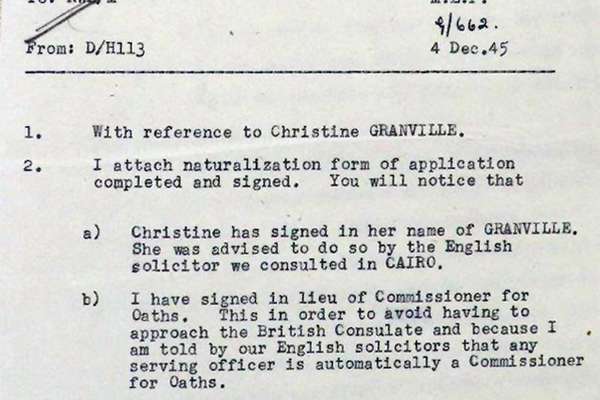In pictures
Coming to Britain
Our collections offer a wealth of detail about the lives of people who have migrated to Britain. Records include naturalisation applications, citizenship documents, and key pieces of government legislation.
Refusal of naturalisation for Karl Marx

- Date
- 17 August 1874
- Catalogue reference
- HO 45/9366/36228
The act of obtaining a police report on the respectability of a naturalisation applicant and their referees was established in 1873. This report, from the Metropolitan Police effectively ended Karl Marx' quest to become British:
“Carl Marx – Naturalization
With reference to the above I beg to report that he is the notorious German agitator, the head of the International Society, and an advocate of Communistic principles. This man has not been loyal to his own King and country"
Referee statement for the naturalisation of Michael Marks

- Date
- 5 May 1897
- Catalogue reference
- HO 144/407/B23729
Naturalisation applications had to be vouched for by British referees, one of whom had to be a resident referee who vouched for the applicant's places of residence in the eight years prior.
Michael Marks sought the reference of his business partner Thomas Spencer. His application was successful and Marks became British on 5 May 1897.
Together, he and Spencer would form the British retail chain Marks & Spencer.
Alien Registration card for Ernst Freud

- Date
- 1933–1939
- Catalogue reference
- MEPO 35/29/4
Like thousands of Jews, Ernst fled Nazi Germany in 1933 with his wife Lucie and sons Stephen, Lucian and Clement. He arrived in London on 21 July 1933 and settled in Hampstead, London.
Ernst was immediately required to register his details at his local police station, and notify them of any changes, a condition of the British Nationality and Status of Aliens Act, 1914.
Aliens were allowed to apply for naturalisation after they had been resident in the UK for at least five years so, in 1939, Ernst and his wife applied. He and Lucie became British citizens on 30 August 1939, just four days before Britain declared war on Germany. Naturalisation was extended to his three sons, all of whom were minors under the age of 21.
The British Nationality Act, 1948

- Date
- 1948–1949
- Catalogue reference
- BT 217/2349
On 30 July 1948, the British Nationality Act 1948 was given royal assent: it came into force on 1 January 1949. The Act created the new status of ‘citizen of the United Kingdom and Colonies’ (CUKC) for people born or who were naturalised in either the United Kingdom or one of its colonies.
The Act gave everybody from the Commonwealth British citizenship, though they needed to register to fully benefit and qualify for a British passport.
As well as workers from the Commonwealth who would help rebuild Britain after the end of the Second World War, thousands of students would also settle in the UK to pursue higher education.
The Race Relations Act 1968

- Date
- 1968
- Catalogue reference
- LAB 44/286
The earlier Race Relations Act in 1965 made it illegal to discriminate on “grounds of colour, race, or ethnic or national origins”. But the Race Relations Act 1968 went one step further, making it illegal to refuse housing, employment, or public services to a person on the grounds of colour, race, ethnic or national origins.
Featured article
Record revealed
Christine Granville’s application to become a British citizen

Christine Granville, Special Operations Executive agent extraordinaire, was Churchill’s favourite spy. How did this document possibly save her life?